Dreams of my mother Aruna(Dutt) Shah,1921-1989
Category:
Tags:
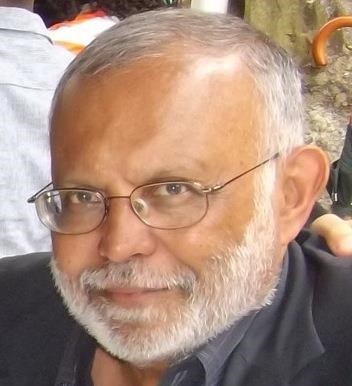
Amit is a semi-retired publishing executive and owner of Green Comma, a service company for education and social-impact nonprofits. He lives in Somerville, MA, with his wife, Pam, and three cats. His two sons, Arnav, 27, and Simon, 21, did not ever get to meet their gentle grandmother, Aruna (Dutt) Shah.
Ma, as I called my mother, was 95 on April 14th, 2016. I cannot imagine what she’d be like physically. She died when she was 68.
Though my father dominated my life with his outsize emotions and contradictions, drive and aspirations, my mother gave me the tools for living . . . love of reading, of trying to understand the strength of humility, of much laughter and fortitude, and appreciation of beauty where I can find it.
She married my father, then 25, when she was 21, in the middle of the Second Word War, in 1942. A college graduate Bethune College, Calcutta, English honors , she was the oldest in a family of four children and a widowed mother. Those who know India will understand that a widow with four children, the youngest was ten, faced a very difficult situation at that time. Her father had died suddenly after a brief bout with meningitis, long before there were vaccines, when she was eleven, and her brother, the youngest, was still in my grandmother's womb.
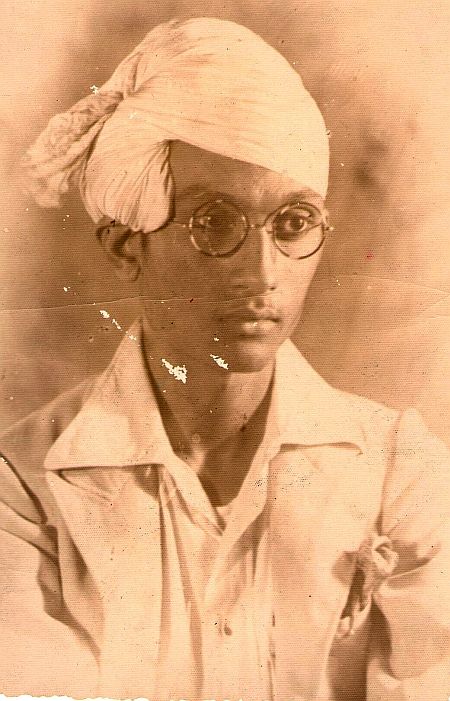
Aruna's father, N.K. Dutt, sometime in the 1910s when he graduated from the university.
Her father had been the Post-Master General of Bengal, an important civil service job. Yet, his pension and death benefits were not enough to sustain the young family in Calcutta. Nor was it of any advantage to be part of the illustrious Dutt family of Rambagan. The family that split into two sections, one Hindu and one Christian and left an indelible mark on Indian history through their vigorous participation as politicians, writers, poets, economists and humanists.
To make some additional income, my grandmother, Didu, started teaching sewing and embroidery at the local St. John's Diocesan School, She also tutored young children outside of school.

Aruna Shah, 1942
As the oldest child, Ma was allowed to go to college so that she could earn some money for the family. Baba (my father) and Ma knew each other from the local church. When Baba proposed marriage he needed Didu's assent. Didu gave a conditional approval. The condition was that he would be responsible for the whole family. Baba agreed. They were married at St. Mary's Church on August 25, 1942.
Her first-born, a girl, Reena Archana, died in her first year. She had some kind of blood poisoning from a vaccination, I was told. She was buried in an unmarked grave in Krishnagar, about 65 miles north of Calcutta. My parents had moved to north Bengal with the Calcutta School for the Blind, started by my father's grandfather in the 19th century, which had evacuated to Krishnagar during the war. The only Christian cemetery in that town was a military one and reserved only for the English.
My parents never spoke about it. But I pestered Ma for stories. The baby was named Reena Archana after the English military nurse who delivered her. This was perhaps the beginnings of my curiosity for historical details and timelines. Where was Ma when she heard Netaji Subhas Bose's radio address from the Nicobar Islands? What was it like to see the road next to the river in Calcutta, Red Road, turned into a landing strip from where American planes flew the "Hump" (over the Himalayas) to supply the British special forces, the Chindits, under Brigadier Wingate in Burma. Did you see Subhas Bose at his Elgin Road house? You were practically neighbors since you lived at Mullen Street, spitting distance from the Bose residence.
The photo is of my sister, Swapna Arpana, who was born in July 1946 about two weeks prior to vicious communal rioting known as the "Great Calcutta Killing."

Aruna Shah with daughter Swapna Arpana, 1946
My father left for the US, as a scholarship student at Teachers College, Columbia University, where he was to receive a certificate in the education of the visually handicapped, for one year a week after my sister's birth. He boarded a freighter, the SS Bates Victory, at Calcutta harbor, because postwar shipping was in total disarray and traveled for four months via the Cape of Good Hope and Gibraltar and across the Atlantic to Boston harbor.
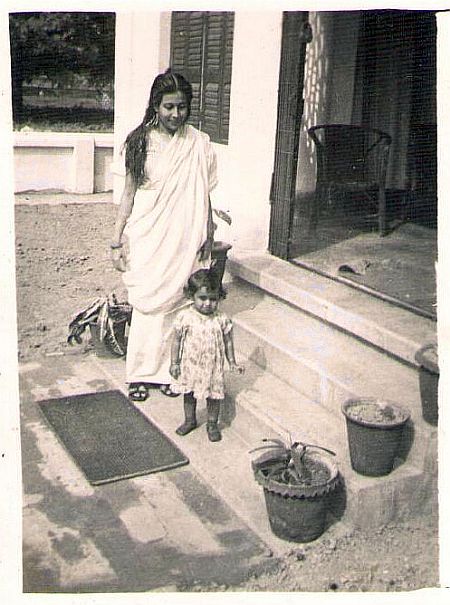
Aruna Shah with daughter, Swapna, 1947.
In the meantime, Ma and my sister lived with an aunt of my father's in a two-room cottage near Bishnupur, on the outskirts of Calcutta. My parents' relationship with my father's family was very strained at that time. By the time he returned, India was independent and the many trysts with destiny had begun.
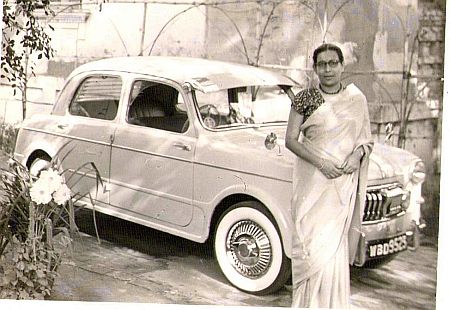
Aruna Shah, 1958.
I loved sitting with my Ma, eating lunch after school (school was from 8 a.m. to 1 p.m. and then sports and study hall), pestering her with questions about her life\; her memories of her friends\; and what interested her. I instinctively understood her struggles, though I couldn't frame them till late in adulthood. I didn't understand her strength and grit till my late teens. She suffered from bouts of depression and weathered a lot of emotional storms with my father, who was completely immersed in his career, his travels, and his public life.

L to R: Swapna (Aruna's daughter), Aruna, Amit (Aruna's son), Amal (Aruna's husband) Jasidih, Bihar (now Jharkhand) 1960.
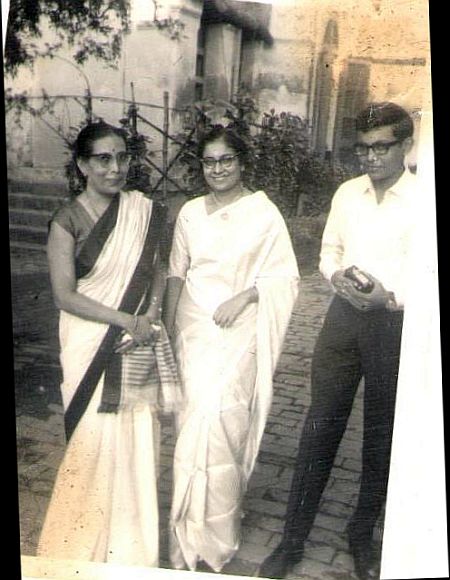
L to R: Aruna, daughter, Swapna, son, Amit. August 1966, when Swapna left for the U.S.
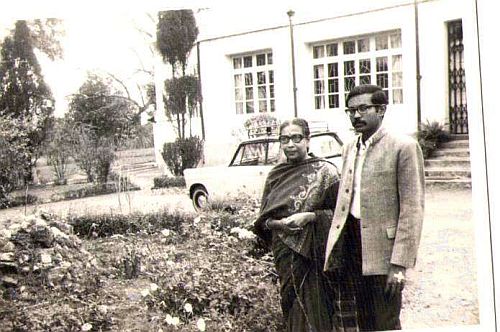
Aruna with son Amit. Hazaribagh, Bihar, where Aruna and her husband had retired. February 1971, a month before Amit left India for the U.S.
Some of what I remember most are a few stray items from a life:
- Swallowing her wedding ring. Slipped it off her fingers when I was about 4, and I was lying next to her one morning. After this Freudian Olympics event, I was raced to the doctor's office for X-rays to locate exactly where the ring. Spoiler alert: All turned out well.
- Under the mosquito net and the crack of dawn, reading/studying the Ramayana and the Mahabharat for Bengali classes with her when I was 8-10 years old.
- Making an igloo out of candle wax for a class project. Ma was so good with her hands. Very craft-y.
- Listening to Bengali radio plays on Akashvani (All India Radio) every Friday evening. Historical dramas, the wrongly-accused-good-guy crime fiction, modern romances were all our favorites.
- Waking up on a weekend morning and always finding a Kit-Kat chocolate bar, which she would get my sister and me every week when she and Baba went to the late-night movies at halls such as Elite, New Empire, Metro, Lighthouse, Globe, Jyoti, Bijali, and ate kati rolls from Nizam's.
- Reading whatever she was reading, including Women's Own romance stories. She never told me what to read or what not to read. She asked me if I understood what happened to the woman in the fields in Good Earth. I was 12. I raced through Peyton Place looking for the "hot" parts. There was only one, I think. Same with 1984.
- Asking her not to tell my dad, when I had to borrow money from her to pay for medicines after I fell off a moving public bus that was turning in the traffic circle at Esplanade in central Calcutta, when I was 15 and limped home with bloody scrapes on my hip and side!
- Teaching her the rules of cricket so that she could keep score on Test matches on the radio while I was at school. She became a huge fan.
- Ma bailing me out in the final year in college at St. Stephen's, Delhi when I ran out of money because I wasted it at the college café and at the university coffee house. I couldn't pay my exam fees, and I didn't dare ask my father. The amount was seven hundred rupees! Though she had squirrelled away some money from the household expenses that my father gave her each month, she couldn't come up with so much money in 1970. She pawned one of her wedding bangles, the age-old recourse of Indian women before our generation. She had one of the servants sell it for her. My father never knew. Not ever.
- Riding the NYC subways with her in the fall and winter of 1983. My dad had passed away in the early summer of 1983. Ma came to the US for six or so months to stay with my sister in Washington, DC, and me in New York City (Brooklyn).
____________________________________________________
© Amit Shah 2016
Editor's note: I approve all comments written by people\; the comments must be related to the story. The purpose of the approval process is to prevent unwanted comments, inserted by software robots, which have nothing to do with the story.
Add new comment